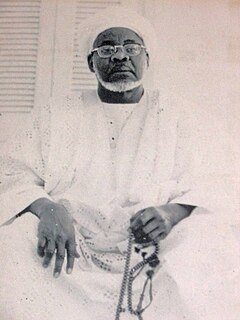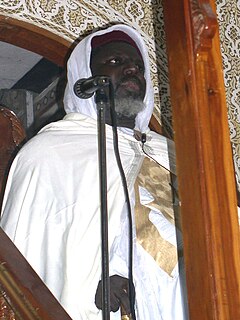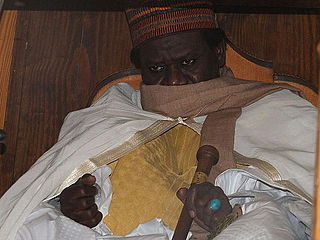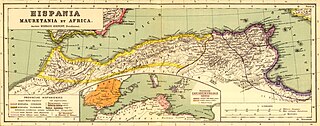A marabout is a Muslim religious leader and teacher in West Africa, and (historically) in the Maghreb. The marabout is often a scholar of the Qur'an, or religious teacher. Others may be wandering holy men who survive on alms, Sufi Murshids ("Guides"), or leaders of religious communities.
Sheikh —also transliterated Sheik, Shykh, Shayk, Shaykh, Cheikh, Shekh, and Shaikh—is an honorific title in the Arabic language. It commonly designates the ruler of a tribe, who inherited the title from his father. "Sheikh" is given to a royal male at birth and the related title "Sheikha" is given to a royal female at birth.

The Tijāniyyah is a sufi tariqa within Sunni Islam, originating in North Africa but now more widespread in West Africa, particularly in Senegal, The Gambia, Mauritania, Mali, Guinea, Niger, Chad, Ghana, Northern and South-western Nigeria and some part of Sudan. The Tijāniyyah order is also present in the state of Kerala in India. Its adherents are called Tijānī. Tijānī place great importance on culture and education, and emphasize the individual adhesion of the disciple (murīd). To become a member of the order, one must receive the Tijānī wird, or a sequence of holy phrases to be repeated twice daily, from a muqaddam, or representative of the order.

Sheikh Ahmadou Bamba Mbacke also known as Khādimu 'al-Rasūl or "The Servant of the Messenger" and Serigne Touba or "Sheikh of Tuubaa", was a Sufi saint (Wali) and religious leader in Senegal and the founder of the large Mouride Brotherhood.

Amadou Hampâté Bâ was a Malian writer and ethnologist.
al-Hajj Umar ibn Sa'id al-Futi Tal, , Umar Saidou Tall, born in Futa Tooro, Senegambia, was a West African political leader, Islamic scholar, Tijani Sufi and Toucouleur military commander who founded a brief empire encompassing much of what is now Guinea, Senegal, and Mali.

The Qadiriyya are members of the Qadiri tariqa. The tariqa got its name from Abdul Qadir Gilani, who was from Gilan. The order relies strongly upon adherence to the fundamentals of Islam.
Amadu III of Masina, also known as Amadu Amadu was the third and last ruler of the theocratic Massina Empire in the Inner Niger Delta, now the Mopti Region of Mali. He was elected as successor to his father, Amadu II of Masina, in 1853. Throughout most of his rule he was involved in conflict with the jihadist al-Hajj 'Umar Tall, who defeated and executed him on 16 May 1862.

Ibrāhīm Niasse (1900–1975)—or French: Ibrahima Niasse, Wolof: Ibrayima Ñas, Arabic: شيخ الإسلام الحاج إبراهيم إبن الحاج عبد الله التجاني الكولخي Shaykh al-'Islām al-Ḥājj Ibrāhīm ibn al-Ḥājj ʿAbd Allāh at-Tijānī al-Kawlakhī —was a major leader of the Tijānī Sufi order of Islam in West Africa. His followers in the Senegambia region affectionately refer to him in Wolof as Baay, or "father." He is the founder of the Ibrāhīmiyyah branch of the Tijānī order, whose adherents designate themselves in Arabic as the people of the Faydah Tijāniyyah or, in Wolof, as Taalibé Baay. Outsiders often refer to his disciples as Ñaseen, which in Wolof means "of or pertaining to the Ñas family," although his disciples do not generally use this designation. Baye niass(cheikh Ibrahim niass) is estimated to have about 250-300million followers today.

Islam is the predominant religion in Senegal. 92 percent of the country's population is estimated to be Muslim, mainly Sunni of Maliki school of thought with Sufi influences. Islam has had a presence in Senegal since the 11th century. Sufi brotherhoods expanded with French colonization, as people turned to religious authority rather than the colonial administration. The main Sufi orders are the Tijaniyyah, the Muridiyyah or Mourides, and to a lesser extent, the pan-Islamic Qadiriyyah and the smaller Layene order. Approximately 5-10% of the Muslims are Shiites and 1% of the Muslims follow the Ahmadiyya thought.

Articles related to Mali include:
Sheikh Uways Al-Barawi was a Somali scholar credited with reviving Islam in 19th century East Africa.
Maba Diakhou Bâ, also known as Ma Ba Diakhu, Ma Ba Diakho Ba, Ma Ba Jaaxu, Mabba Jaxu Ba, was a Muslim leader in West Africa during the 19th century. Born in Rip, Maba was a disciple of the Tijaniyya Sufi brotherhood and became the Almami of Saloum.
Tierno Bokar, full name Tierno Bokar Saalif Tall (1875–1939), was a Malian mystic, Sufi sage, and a Muslim spiritual teacher of the early twentieth century famous for his message of religious tolerance and universal love.

Shaykh Hassan Cisse (1945–2008), also written Cheikh Assane Cissé or Shaykh Hasan Cisse, was an Islamic scholar, Sufi shaykh and humanitarian activist who served as Imam of an international Muslim community in Medina Baye in Kaolack, Senegal, West Africa.
The Idrisiyya is a Sufi order founded by Ahmad Ibn Idris al-Fasi (1760–1837). It was originally called the Tariqa Muhammadiyya. This was not a Tariqa in the sense of an organized Sufi order, but rather a spiritual method, consisting of a set of teachings and litanies, aimed at nurturing the spiritual link between the disciple and Muhammad directly.

In Mali, football is played widely and followed avidly, football is the most popular sport in Mali. Large professional clubs and international competition draw much popular attention, and the sport is played as a pastime.
Hamallayya or Hamallism is a sufi ṭarīqah originating in West Africa as an outgrowth from and reaction against the Tijaniyyah brotherhood. It was founded at the beginning of the 20th century by a mystic Muhammad ben Amadu of Maure and Fulani background, as reform movement of Tijaniyyah practice. Stressing opposition to hierarchy and downplaying the importance of education, the movement spread in the 1920s by Amadu's disciple Shaykh Hamahullah bin Muhammad bin Umar (1886–1943) in what was then French Soudan, modern Mali. It first took root amongst Wolof traders living in Nioro, but soon spread to servile caste Muslims in Mauretania and Mali.

Habib Umar bin Hafiz is a Yemeni Sufi Islamic scholar, teacher, founder and the dean of Dar al-Mustafa Islamic seminary. He also a member of the Supreme Advisory Council for the Tabah Foundation in Abu Dhabi.

Sheikh Ahmad Tijani Ali Cisse is the spiritual leader of the Tijaniyya Sufi order. The Tijaniyya is the largest Sufi order in Western Africa and its leader is responsible for nearly 300 million Sufi adherents.

















